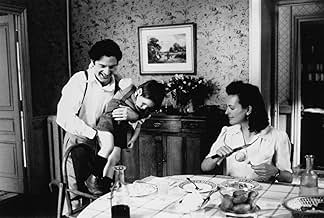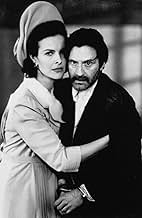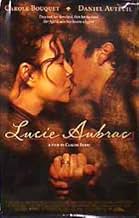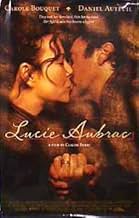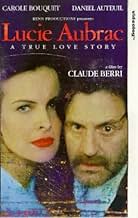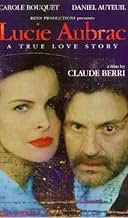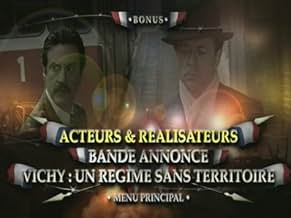Lucie Aubrac
- 1997
- Tous publics
- 1h 55min
NOTE IMDb
6,6/10
1,5 k
MA NOTE
En 1943, Raymond Aubrac est arrêté avec Jean Moulin par la Gestapo. Lucie, la femme d'Aubrac, ne reculera devant rien pour libérer son mari des griffes de la police allemande.En 1943, Raymond Aubrac est arrêté avec Jean Moulin par la Gestapo. Lucie, la femme d'Aubrac, ne reculera devant rien pour libérer son mari des griffes de la police allemande.En 1943, Raymond Aubrac est arrêté avec Jean Moulin par la Gestapo. Lucie, la femme d'Aubrac, ne reculera devant rien pour libérer son mari des griffes de la police allemande.
- Réalisation
- Scénario
- Casting principal
- Nomination aux 1 BAFTA Award
- 3 nominations au total
Avis à la une
This is a rather small and quiet WWII film. While the film excels at its realistic portrayal of the French Resistance, it is a film that would be "box office poison" in America because its commercial marketability is pretty limited. This is NOT a film that teens or many prospective viewers would rush to the theaters to see! There are few explosions and the nudity isn't the least bit gratuitous. Because of this, it would only have been made abroad or by an independent film maker and so it wasn't surprising that this film was shown on the Sundance Channel.
The story purports to be about a real couple who worked for the resistance movement. When the husband (Daniel Auteuil) is taken by the Nazis, his devoted wife (Carole Bouquet) tries desperately to free him. Both actors are pretty recognizable to American audiences, as Auteuil has appeared in tons of films--playing a sort of "everyman" character and Bouquet played the female lead in one of the Bond films (FOR YOUR EYES ONLY), though she's done plenty of films as well. For a 40 year-old lady, Bouquet is amazingly beautiful and sensuous--way to go, girl! The action is very low-key but tense and the film is a very enjoyable history lesson designed for an adult and discriminating audience.
The story purports to be about a real couple who worked for the resistance movement. When the husband (Daniel Auteuil) is taken by the Nazis, his devoted wife (Carole Bouquet) tries desperately to free him. Both actors are pretty recognizable to American audiences, as Auteuil has appeared in tons of films--playing a sort of "everyman" character and Bouquet played the female lead in one of the Bond films (FOR YOUR EYES ONLY), though she's done plenty of films as well. For a 40 year-old lady, Bouquet is amazingly beautiful and sensuous--way to go, girl! The action is very low-key but tense and the film is a very enjoyable history lesson designed for an adult and discriminating audience.
Claude Berri began filming this movie in 1996 with Daniel Auteuil
and Juliette Binoche. Berri and the headstrong Binoche came to
(creative) blows over script changes. He wanted to make it more of
a love story, she wanted it to remain more factual and so in a move
unheard of in French cinema he fired his leading actress, who
also happened to be the biggest French star in the world. A few
monthe later she won an Oscar for The English Patient and berri
recast his movie with Carole Bouquet in the lead.
Bouquet is a talented actress, but not in the same league as the
extremely gifted Binoche. Auteuil as usual gives a fine
performance, but the whole excersise seems leaden down by
romanticism.
Binoche and Auteuil went on to star together in Leconte's
altogether better La Veuve de Saint-Pierre
and Juliette Binoche. Berri and the headstrong Binoche came to
(creative) blows over script changes. He wanted to make it more of
a love story, she wanted it to remain more factual and so in a move
unheard of in French cinema he fired his leading actress, who
also happened to be the biggest French star in the world. A few
monthe later she won an Oscar for The English Patient and berri
recast his movie with Carole Bouquet in the lead.
Bouquet is a talented actress, but not in the same league as the
extremely gifted Binoche. Auteuil as usual gives a fine
performance, but the whole excersise seems leaden down by
romanticism.
Binoche and Auteuil went on to star together in Leconte's
altogether better La Veuve de Saint-Pierre
This film is an excellent tribute to the bravery of the men and women of the French Resistance during the Second World War. The film revolves around Lucie and her attempts to rescue her husband, after he is arrested by the Gestapo at a Resistance meeting. This film is indeed a testimony to Lucie and Raymond's relationship, but in my mind, the film serves equally as an insight into France during the occupation and the political state at the time. An excellent film. - Jonno
8B24
Engaging story and performances involving members of the French resistance during World War II. Although I have not yet read the account on which it is based, I have no reason to believe the film takes too many liberties with the truth. The locations and sets seem very authentic, and the dialogue is evocative of the way people spoke at the time. Something exceptional is presented by way of action sequences, in fact, where attempts at re-enacting simple events on film often fail; namely, the interdiction of a convoy carrying prisoners and a particularly realistic execution scene. High marks are due the production crew for this one. The overall history of the French resistance is an extremely complicated tale to be retold for purposes of explaining just how this story resonates. Young viewers need to educate themselves in that history in order to appreciate fully this film's merits.
First-rate acting and smooth direction make this personal recounting of controversial Resistance events well worth seeing. As with all films by Claude Berri, the storytelling is direct and the cinematography is both poignant and sensitive. Daniel Auteuil is great as usual. Carole Bouquet also contributes, albeit with less emotional range. The movie focuses as much on the love between Lucie and Raymond Aubrac as on the historical events surrounding them as they participate in the French Resistance to German occupation during World War II. The movie also contains powerful action scenes of escape and guerilla fighting (which the Germans considered terrorism at the time). Watch for a striking scene where Heino Ferch (as Klaus Barbie) tortures Auteuil (as Lucie's husband Raymond) to obtain information about Resistance leader "Max". Not only is this scene memorably acted and filmed, but it bears on a most controversial event in the history of the Resistance. The script follows a book by Lucie Aubrac that is ostensibly autobiographic. To this day, historians debate whether the Aubracs remained committed to the resistance or whether Raymond actually cracked under torture and betrayed resistance mastermind Jean Moulin ("Max"). Moulin was arrested soon after Raymond left prison and died a hero, refusing to speak under the torture of Klaus Barbie, the "Butcher of Lyons". These events and Barbie's much later in persona trial (1987) still rattle many people's understanding of the morals and history of France in the last sixty-plus years.
Le saviez-vous
- AnecdotesThis movie's closing afterword is by Lucie Aubrac herself in a written letter. It states: "I agreed to lend my name to this film because of Claude Berri's contribution to the Resistance Foundation." Lucie Aubrac
- GaffesOne of the Citroën cars has an oval F plate, meaning the country where the car is registered is France. These country plates rarely appeared before 1949, when a Geneva convention instituted them. They were usually in metal. Plastic ones, as in the movie, appeared in the 1960s.
- ConnexionsFeatured in D'après une histoire vraie: Lucie Aubrac, une vie de résistance (2021)
Meilleurs choix
Connectez-vous pour évaluer et suivre la liste de favoris afin de recevoir des recommandations personnalisées
- How long is Lucie Aubrac?Alimenté par Alexa
Détails
- Date de sortie
- Pays d’origine
- Langue
- Aussi connu sous le nom de
- 烽火一世情
- Lieux de tournage
- Préfecture du Rhône, 106 rue Pierre Corneille, Lyon, Rhône, France(scenes at the Kommandantur's headquarters)
- Sociétés de production
- Voir plus de crédits d'entreprise sur IMDbPro
Box-office
- Montant brut aux États-Unis et au Canada
- 394 079 $US
- Week-end de sortie aux États-Unis et au Canada
- 19 644 $US
- 19 sept. 1999
- Montant brut mondial
- 394 079 $US
- Durée1 heure 55 minutes
- Couleur
- Mixage
- Rapport de forme
- 2.35 : 1
Contribuer à cette page
Suggérer une modification ou ajouter du contenu manquant


